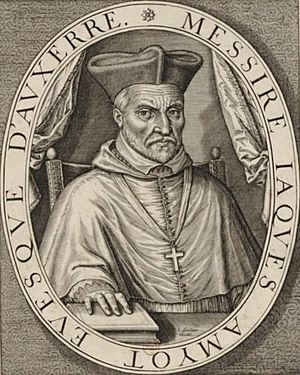Jacques Amyot facts for kids
Jacques Amyot (born October 30, 1513 – died February 6, 1593) was an important French bishop, scholar, writer, and translator during the French Renaissance. He was born to a poor family in Melun, France. Despite his humble beginnings, he became very famous for his translations of ancient Greek and Latin texts, especially the works of Plutarch.
Contents
Life and Education
Jacques Amyot found a way to attend the University of Paris. He supported himself there by helping wealthier students. By the age of nineteen, he earned his Master's degree from Paris. Later, he also earned a degree in civil law from Bourges.
Through a man named Jacques Colure, who was an abbot (a leader of a monastery), Amyot got a job. He became a tutor for the family of a government secretary. This secretary then recommended him to Margaret of France, Duchess of Berry. With her help, Amyot became a professor of Greek and Latin at Bourges.
Important Translations
While teaching at Bourges, Amyot translated a book called Æthiopica by Heliodorus in 1547. For this work, King Francis I rewarded him with an abbey (a type of monastery) called Bellozane.
This reward allowed Amyot to travel to Italy. His main goal was to study the original texts of Plutarch at the Vatican. He had already started working on translating Plutarch's famous Lives. On his way, he also took part in a mission to the Council of Trent, an important meeting of the Catholic Church.
Service to Kings
When Amyot returned to France, he was chosen to be a tutor for the sons of King Henry II. One of these sons, Charles IX, later made Amyot his grand almoner in 1561. An almoner was a church official who managed charity for the king. Another son, Henry III, later appointed Amyot as a commander of the Order of the Holy Spirit. This was a very high honor, especially since Amyot came from a common family.
In 1570, Pope Pius V made Amyot the bishop of Auxerre. He lived a relatively peaceful life there, working on his cathedral and finishing his translations. He was a very religious and dedicated churchman.
His Legacy
Jacques Amyot translated several important ancient works. These include seven books by Diodorus Siculus (1554), Daphnis et Chloë by Longus (1559), and Plutarch's Opera Moralia (1572).
His most famous work was his strong and natural translation of Plutarch's Vies des hommes illustres (Lives of Famous Men). This book was later translated into English by Sir Thomas North. It became a key source for Shakespeare when he wrote his famous Roman plays, like Julius Caesar and Antony and Cleopatra.
The famous French writer Montaigne greatly admired Amyot. He said that Amyot was the best French writer for his simple and pure language, his dedication to such a big project, and his deep knowledge. Montaigne especially thanked Amyot for choosing such a valuable work to translate.
Amyot spent a lot of effort on Plutarch's writings. He carefully researched and tried to understand the best original texts. Today, his books are still admired for their writing style. His translations read as if they were original works. Plutarch's focus on individual lives and stories appealed to people at that time. Because of this, Amyot's book became incredibly popular and influenced many French writers for generations.
Images for kids
See also
 In Spanish: Jacques Amyot para niños
In Spanish: Jacques Amyot para niños
 | Sharif Bey |
 | Hale Woodruff |
 | Richmond Barthé |
 | Purvis Young |



